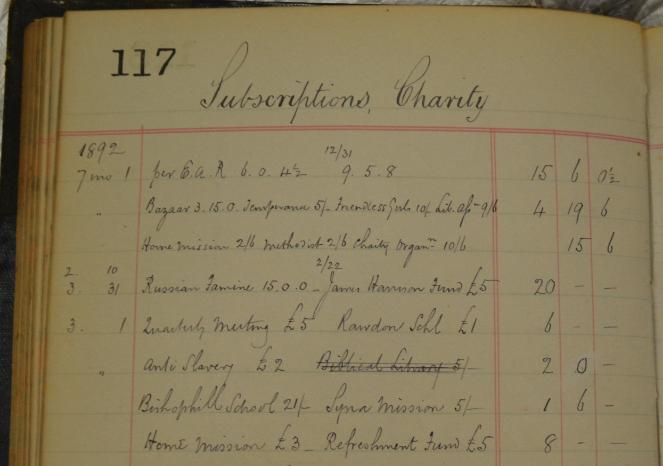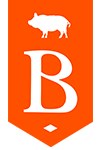Borthwick Newsletter - December 2023
Posted on 30 November 2023
December in the Archives - delve into our catalogues with this month’s featured description
Papers relating to the Parliament Scheme 'Toffee de Luxe' Promotion, a scheme by which a tin of Toffee de Luxe, with a cover depicting the Houses of Parliament, was placed on each Member of Parliament's seat as they returned to the House of Commons in December 1924 [John Mackintosh & Sons Ltd Archive, M/S/ELF/57]
What’s new?
It’s hard to believe the end of 2023 is fast approaching. If you’re planning a visit to the archives before 2024, the Borthwick will be open for appointments until the end of Wednesday 20th December and then will re-open to researchers on Monday 8th January. As always, you can contact us by phone or email, or pop into the searchroom, Monday to Wednesdays, to speak to staff in person who will be happy to answer any queries you may have or get you booked in for a visit.
There have been a few changes to the team in November. We were sorry to say goodbye to archive assistant Liz Wilson who has been an enormous help in the searchroom over some very busy months but now returns to her substantive post in the university library. However we’re happy to welcome Emma Hollis to the Borthwick team. Emma has been appointed Project Archivist for the Alcoholics Anonymous Great Britain Archive. The archive first came to the Borthwick in 2009 and has been added to regularly ever since, currently standing at a whopping 616 boxes of material. Emma’s role will include keeping the catalogue up to date and dealing with related research enquiries. The size and subject matter of the archive make it an especially complex and sensitive one and we’re very fortunate to have a dedicated archivist to oversee its use.
Finally we are very pleased to announce that Lydia Dean has been appointed to the post of Archivist (Research Services). This is a new post and Lydia will be managing our searchroom team and overseeing our in-person and remote research services to ensure the provision of in depth research support services to staff, students and our global community. Many of you who have visited the Borthwick in the past will have met Lydia as she has been a member of the searchroom team for over a decade, as well as Project Archivist for both the Yorkshire Wildlife Trust and Company of Merchant Adventurers for the City of York cataloguing projects. She’ll be taking up her new position on the 4th December.
New Accessions
It’s been a bumper month for accessions, with fourteen additions to the archives. Some of these were additions to existing collections. Three former students contributed photographs, writings and other ephemera to the University of York: Student Life archive, documenting their experiences at York in the 1960s, 1970s and 1980s. There was also correspondence relating to a war memorial to be added to the parish archive of York St Denys and recordings of Minster FM news bulletins to go into the York Covid-19 archive.
Two of our writing and performance archives also received new additions: we took in fifteen more boxes of material to add to the archive of playwright Alan Ayckbourn, as well as a book, concert programmes and ephemera to be added to the archive of composer Trevor Wishart. The Ayckbourn material comprises multimedia recordings of filmed and live productions and documentaries from the 1960s-2010s, as well as draft scripts, posters, press articles, reviews and correspondence, making it a valuable addition to an already large and rich archive.
We also received three brand new archives with links to Ayckbourn. The archive of Rodney Wood tells the story of the Library Theatre, Scarborough, and Ayckbourn’s career there from 1955 to 1972; whilst Godwin’s comprises annotated rehearsal scripts for 1970s Ayckbourn stage productions in which he performed, together with handwritten notes and sketches. Mooney’s is the largest, at seven boxes, and covers more than sixty years of West End and American premieres of Ayckbourn productions, including programmes, reviews and press cuttings.
Finally we received a brand new Rowntree archive, a small collection gifted by the family of Philip Rowntree, the son of Seebohm Rowntree. As well as working for the family confectionery business, Philip was also a long time director of the Joseph Rowntree Reform Trust and we recently catalogued records relating to his work there as part of the JRRT Archive. The new archive includes family photographs and a copy of a documentary based on Seebohm Rowntree’s 1911 survey of unemployment in York, but perhaps the most exciting part are two household ledgers belonging to Philip’s grandfather Joseph Rowntree.
The ledgers record his household accounts between 1862 and 1903, divided up under headings such as subscriptions, groceries, clothing, gardening, medicine, travel, presents, education, books and stationery, and ‘sundries’ - which includes the pocket money given to his children. There’s even a mention of £50 given to Seebohm Rowntree for his ‘poverty work’, this being his famous 1901 poverty survey of York, published as ‘Poverty: A Study of Town Life’. The ledgers offer a unique insight into Joseph’s home life and the many and varied costs that went into the running of a wealthy household in 19th century York. The ledgers are available to view so please do contact us to make an appointment if you’d like to see them for yourself.
New Catalogues
Number of archival descriptions on Borthcat on 1st December 2023: 132,420
We added full catalogues for the parish archives of Bielby and Allerthorpe to Borthcat in November but our biggest new addition was the completed catalogue of the Company of Merchant Adventurers of the City of York Archive. The catalogue is the result of four months hard work by Project Archivist Lydia Dean, drawing on the 1994 catalogue by David M. Smith and subsequent work on the collection by the Company’s Honorary Archivists Rita Freedman and Jill Redford.
The cataloguing project, which forms part of a wider collaboration with the Company, began in the summer with an onsite assessment of the archive at the beautiful Merchant Adventurers Hall on Fossgate. In July, the archive was moved across the city, from the Hall to its new home here at the Borthwick Institute, and work began on converting and adapting the existing finding aids into a newly accessible catalogue. This process built on these detail-rich earlier catalogues, adding unique reference numbers to more recent additions to the archive and also linking entries by subject terms, to allow for new connections to be made both within the archive and to other related collections. It was also a fabulous opportunity to delve into this fascinating and extensive archive which ranges from the late 12th century through to the present day. Included amongst its treasures are charters, indentures, minutes, correspondence, and maps, allowing researchers to explore the business, social, and religious history of the city of York. Watch this space over the next few weeks for further information on the project and some snippets from the archive!
News from Rare Books Collection and York Minster Library
We’re delighted to announce that all the incunabula in the rare books collection and at York Minster Library are now reported to Material Evidence in Incunabula. MEI is a database specifically designed to record and search the material evidence (or copy specific, post-production evidence and provenance information) of 15th-century printed books: ownership, decoration, binding, manuscript annotations, stamps, prices, etc. MEI is linked to the Incunabula Short Title Catalogue (ISTC), provided by the British Library, from which it derives the bibliographical records, and it allows the user to combine searches of bibliographical records (extracted from ISTC) with copy specific records.
The level of detail can be seen from this record of St Brigids revelations. Thanks to the Friends of York Minster for funding this project.
The latest exhibition in the Treasury features material from York Minster Library and the Borthwick. Treasures: Yorkshire’s people and parishes celebrates the parish collections at the Minster.
Borthwick Out and About
November marked the last full month of teaching for 2023 so we have been busy with our usual round of classes and student visits - and not all of them from the university! On the 15th November we had a visit from York and Pocklington A Level students who were spending a day at the university and visited the Borthwick to see some of our records relating to subjects they’re studying. This included the Lancastrians and Tudors, 19th century public health, and, as a bonus, the York confectionery industry and some very colourful 1970s Quality Street packaging. Archivists were on hand to introduce the records and answer any questions and the students enjoyed the opportunity to get hands on with the documents.
We also held our event, ‘Exploring Disability History in the Archives’, on the 30th November. The display of documents and volumes from across archives and Rare Books sought to bring to light an often overlooked perspective in history, the treatment of those living with disabilities and how activism led to a greater understanding of disability and the legal protections we have today.
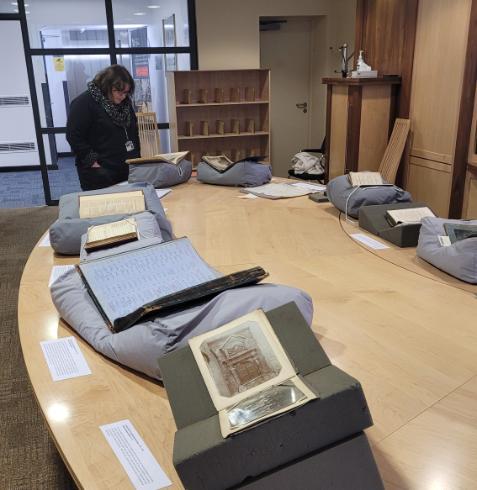
Away from campus, Access and Digital Engagement Archivist Laura Yeoman represented the Borthwick at York Army Museum’s Military Memorabilia Day on the 19th November, answering questions about military records here and elsewhere. You can watch a short video by Laura discussing some of the military records in our collections on YouTube.
Lastly, if you’ve visited the Borthwick space in the past two weeks you may have noticed a brand new exhibition ‘Arts of the Islamic World’. The exhibition marks the launch of the university’s postgraduate degree of the same name and celebrates more than 1000 years of Islamic material culture. It is the first Islamic art exhibition at York and you can view it, for free, until June 2024 in the Samuel Storey Gallery (follow the stairs to the next floor up from the Borthwick reception and searchroom).
Archive of the Month: York Archbishops Registers
What is it? A record of the business performed by the Archbishop of York and his officials in the province and diocese of York from 1225 to 1928.
Where can I find it? The registers are catalogued on Borthcat in full, alongside free digitised images of the registers between 1225 and 1650. You can also read more about registers, search the indexes, and view the digitised images on the dedicated York Archbishops Registers database.
Why is it Archive of the Month? Strictly speaking the registers form only one part of the vast York Diocesan Archive, but they are in many ways the backbone of the archive and deserve to be considered in their own right. They are the record of the main business of the Northern province of the church, from pronouncements of faith and letters sent to Kings and Popes, to the institution of parish clergy and matters of clerical discipline. As a source for the history of Northern England in the mediaeval and early modern period in particular, they are utterly unique. It is in the registers that you can find the long lists of clergy ordinations in 1349 that show the devastating effects of the Black Death on the church, alongside the Archbishop’s warning of ‘great mortalities, pestilences and infections of the air’. A later register also contains copies of the official statements relating to King Henry VIII’s divorce from Anne of Cleves and the final letter of Henry’s doomed statesman Thomas Cromwell, who was instrumental in arranging the match with Cleves, begging the King for ‘mercy mercy mercy.’
These are the high profile entries (and entries we enjoy bringing out at Open Days!) but just as fascinating are the smaller and more individual stories that hint at how more there might still be to find as researchers continue to explore the registers. An entry in 1280 details complaints against the seemingly incorrigible Abbot of Selby Abbey, Thomas de Whalley, who had already been removed from his post once, and was now found to be avoiding most parts of his job - including preaching, teaching and collecting taxes for the church. He had however found the time to procure ‘at great expense’ the services of one Elyam Fanuelle, a ‘sorcerer and fortune teller’, and to allegedly father a child with a woman of the town. Unsurprisingly de Whalley was removed from his post a second time and excommunicated for good measure. Another surprising story was that of Joan of Leeds, a nun at Clementhorpe in York who in 1318 faked her own death and ran away. According to Joan, she had been forced to enter the convent by her parents and ‘continually protested’ her fate. After we shared Joan’s story on social media, it went viral, appearing on news websites all over the world and even inspiring a Joan themed Christmas burlesque at a London theatre.
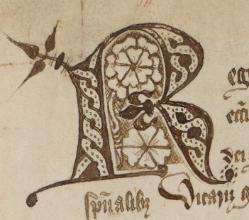
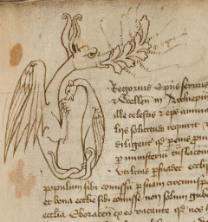
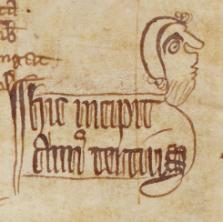
Whilst not all of the stories in the registers are quite as dramatic as Thomas de Whalley or Joan of Leeds, they serve to remind us that the mediaeval and early modern church was a very human institution and that the registers reflect the ideals and the failings of the society in which they were written. They are a chronicle of the times and although they can be hard to access - the use of ecclesiastical Latin is naturally a key feature - they’ve never been so easy to explore than they are now, thanks to the Northern Way project which indexed the digitised registers by name, place and subject. Browse them by indexed terms, or listen to podcasts, read articles or watch presentations about them via the ‘further resources’ page. Or just admire the beautiful penmanship and marvel at the fact they have survived for so many hundreds of years to be available for everyone to enjoy.
We’ll be back in 2024 with more news from the archives!

